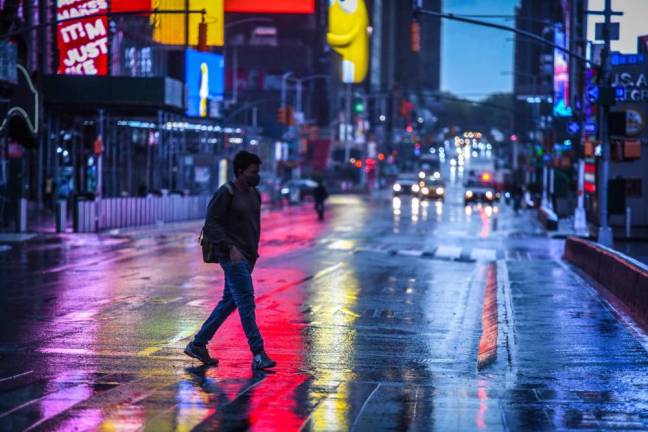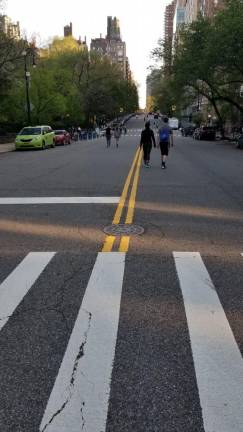Mood of the City
New Yorkers are experiencing a spectrum of anxieties, say mental health professionals - a loss of identity and a fear of going back out into the world


Friday, May 15th was the first real summer night in New York City, Twitter users declared last week when there was an unmistakable shift in the weather: a temperature in the 80s, and blue skies giving way to a warm, but not-quite-muggy, night. Though, still in the midst of a crisis, it was unlike any other summer night in the city’s recent memory.
“It's unbearable to think about what would be going on otherwise on a night like this,” Rachel Syme, a contributor for the New York Times and The New Yorker, wrote on Twitter.
She and other New Yorkers had some ideas: happy hour drinks at a crowded and clamoring outdoor café; after-work picnic in the park with friends, a cooler of beer and a Polaroid camera; leaving an evening movie theater surprised to find it’s still light out; opting for the long walk home just because.
As the shelter-in-place order has been extended, for now, until the end of May, there is a collective mourning among New Yorkers for their old lives in the city. And yet, even with the yearning for an evening out, free of risk, among those same New Yorkers there’s also a sense of uncertainty and anxiety at the prospect of emerging from one’s home and reentering the world with the specter of virus hovering above every surface and stranger passing by.
Mental health professionals practicing in Manhattan discussed the spectrum of anxieties New Yorkers are having during this unprecedented crisis, which appears to have no clear solution.
Rory Rothman, a psychoanalyst and faculty member at the Center for Modern Psychoanalytic Studies, acknowledged a cycle of anxiety New Yorkers have experienced since the pandemic began: shock, somatic concerns, confinement concerns, concern that this would be permanent, and now, a fear of going back out into the world.
“Even though now we're opening up, it's still fraught with uncertainty,” said Rothman. “We don't know who has what and where and how we can be very safe.”
Rothman said this uncertainty can make people feel as though they’re floating along without a sense of what’s next.
“I think that goes against human nature and the way people like to function,” said Rothman, but added that it’s best to confront the feeling head-on. “One thing I try to do is to kind of embrace the fact that that's actually a feeling and not a fact. Feelings will shift, they will subside, they will change. Allow that feeling and make yourself as comfortable as you can through it ... and know that it's going to pass.”
"Cognitive Dissonance"
Yoon Im Kane, the head psychotherapist, founder and CEO of Mindful NYC in Midtown, said this experience is particularly hard for city residents as they’re experiencing a loss of identity in what it means to be a New Yorker, as defined by a longstanding cultural archetype.
“There's a whole sort of storyline and narrative about what it means to be a New Yorker. And New Yorkers aren't scared. New Yorkers are always unfazed. New Yorkers don’t slow down, they take 10 steps at a time,” said Kane. “When I speak to patients who live in New York, I think I hear the fear in their voice. People are scared. It's sort of a cognitive dissonance for a lot of people.”
She said New Yorkers need to find a way to redefine who they are to help manage the stress of the moment.
“Not being scared doesn't mean that you're not strong. And slowing down doesn't mean that you're not achieving,” she said. “The reality is things will not be the same for a long time. We do have to actually rethink our assumptions about our lives in the city and how we go about making choices every day.”
On top of this, Kane said New Yorkers are grieving the loss of a vibrant city life and are coming to the realization that it may never return the same as it once was.
“There's a great sense of loss of something in this moment that I think needs to happen as a collective group,” said Kane. “I think a lot of people are still in denial. I believe what's going to come next is moving to anger. Then there's going be a lot of depressed people in the coming month or year.”
Kane said New Yorkers have historically been adaptive, and one day should be able to make meaning out of this pandemic with the help of clarity, guidance, good leadership and good mental health support. But, she doesn’t think that can be achieved until we’re on the other side of it.
“You can't really fully go through these stages until you're out of this situation. You're still in shock; you're still in it. You're still in the process of losing. You can only grieve and go through the closure piece of in the cycle of business when you've lost it — and when you know what you’ve lost.”
"There's a whole sort of storyline and narrative about what it means to be a New Yorker. And New Yorkers aren't scared ... When I speak to patients who live in New York, I think I hear the fear in their voice. People are scared.” Psychotherapist Yoon Im Kane